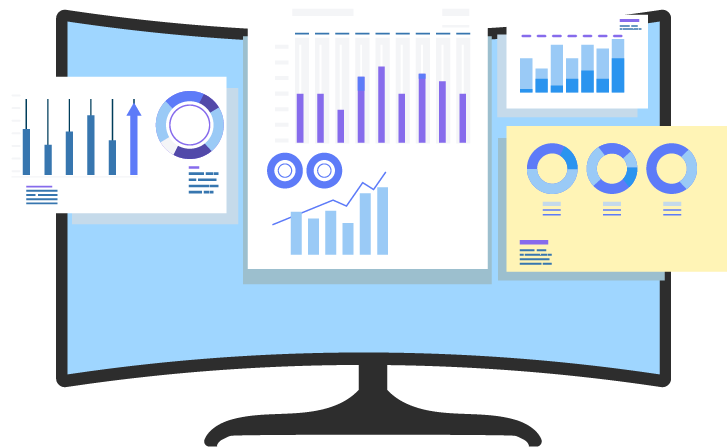Table of Content
Share This Article
- Reading Time: 7 Minutes
- Published: April 27, 2022
- Last Updated: February 7, 2025
Bookkeeping and accounting are primary financial function that is crucial for every business. It involves recording the transactions, preparing financial statements, analyzing them, and preparing financial reports as per the analysis. It was done manually in earlier years, which was hectic and time-consuming. However, with the advent of technology, accounting software came into existence. But, as the number of transactions increased and the processes became complex, accounting software could not always manage everything. The complexity of the entire process, especially for big firms, gave rise to ERP systems. Some popular ERP systems that firms prefer these days are SAP, NetSuite Oracle ERP and Microsoft Business Central. Let us learn what these systems are and which one to use.
What is Accounting Software?
Accounting software can be defined as a computer program that helps the bookkeepers and accountants prepare a firm’s financial records. It allows an easy and faster accounting process with a high level of accuracy. Different firms use different accounting software, and every software has a similar basic feature, but differs from each other due to some additional functionalities.
What is ERP?
ERP or Enterprise Resource Planning is a process that helps a firm in resource planning by integrating all the firm’s processes into a single system. It can incorporate all the business processes needed to run the firm, such as planning, inventory, purchasing, marketing, sales, human resources, finance, etc. Many ERP systems are available as web-based applications and can be accessed anywhere.
When To Switch From The Accounting System To ERP?
Even though the ERP system has been in the market for a long time, many businesses are still unfamiliar with it. These firms still rely on accounting software, but it is getting difficult to manage everything efficiently. When the accounting process is not accessible anymore, plus too much time and costs are spent on it, it is time for the business owner to reconsider their software choice. When a firm starts facing such issues, it is high time to switch from accounting software to an ERP system. Let us look at some signs that the firm needs to change to the ERP system now:
• Too much paperwork:
When there are multiple systems for tracking different transactions, manual data entry is often required to coordinate all the data. Manual data entry is required because accounting software only allows a few business members to access system. So, the data are recorded manually and then later entered into the system by employees with system access. It becomes tedious and increases potential error risk as the business grows. Using an ERP system is a better option and the solution to all the issues in situations like this. ERP handles all the data from multiple systems appropriately and then reconciles them automatically. It decreases the error risk and increases the efficiency of the entire system.
• Lack of access to real-time business data:
Accounting software has inherent API limitations. It makes information exchange between third-party applications and accounting software databases infrequent. So, the third-party data is synced with the system at irregular intervals. The infrequent data exchange and syncing leads to a lack of access to the real-time data of the business at any time. ERP solutions like SAP and Microsoft Business Central overcome this issue by integrating all the business data in real-time.
• Lack of visibility in business growth and limitation:
Some of the biggest issues with accounting software include difficulty tracking the business’s historical data and maintaining data from different locations, systems, etc. ERP integrates all the business data from different sources and systems, enhancing decision-making. The presence of multiple spreadsheets, documents, or systems leaves gaps in the data integration. It leads to a lack of visibility about business growth and limitations, which help make decisions.
• Need for better customer relationship:
Maintaining a better customer relationship involves keeping a real-time track of product information like stock levels, order status, etc. ERP enables real-time tracking of information for the employees and the customers so that they get information that affects their preferences and buying behavior. Better forecasting of customer needs and wants helps personalise their experiences to improve customer relationships.
• Inconsistent customer data:
The accounting software does not always sync with the CRM of the business. The inconsistent customer data affect the accuracy of the entire accounting process. It leads to duplication of customer records. However, an ERP system syncs and integrates with all the software and systems of the business for accurate data records.
• Absence of access control:
Accounting software does not provide access to many employees. The limited access can affect the workflow and coordination among different departments. While using ERP like NetSuite Oracle ERP, the employees have access to business data when they need it. It streamlines the coordination process among the employees and systems, enhancing efficiency.
• Need for better system performance:
Using accounting software requires consolidating data from several systems, and the huge volume of transactions slows down the entire process. It needs only one server and one system to manage all the business data. In such cases, using ERP solutions like SAP and Microsoft Business Central can be beneficial. It improves the efficiency and functioning of the system.
• Need for data safety and regulatory compliance:
Data safety is a priority for every business. But, the use of numerous interfaces and third-party tools like spreadsheets while using accounting software poses a risk to the data and system. However, ERP systems store all the data in a single repository, and the built-in reports help in regulatory compliance.
It is commonly believed that ERP systems are only suitable for big firms. However, it is not valid. ERP can be used by small and medium-sized firms as well. Although it may seem expensive initially, it provides long-term cost savings by properly managing everything. The single system record with in-built reports also aids in making the right business decisions. Check for the signs mentioned above, and if the business is facing such issues, it is the right time to switch from accounting software to ERP.

Get customized plan that supports your growth

Thousands of business owners trust Whiz to manage their account
Let us take care of your books and make this financial year a good one.








